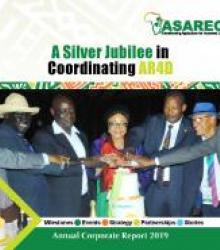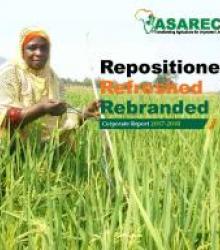| Title | Author | Keywords | Asbract |
|---|---|---|---|
| Second ASARECA-EAAPP Report | Antony M. Kilewe, Violet O. Kirigua and Daniel Kilambya | The East Africa Agricultural Productivity Programme (EAAPP) was conceived in a regional perspective in which Ethiopia, Kenya, Tanzania and Uganda will manage investment with regional objectives to foster agricultural development in the Eastern and Central Africa Sub-region. EAAPP seeks to invest in commodities that have been identified in ASARECAÔÇÖs Strategic Plan as being of sub-regional importance for mitigation of food insecurity. Both ASARECA and EAAPP seek to contribute to the AU/NEPADÔÇÖs CAADP Pillar IV agenda which focuses on revitalizing, expanding and reforming AfricaÔÇÖs agricultural research, technology dissemination and adoption efforts, guided by the Framework for AfricaÔÇÖs Agricultural Productivity (FAAP). |
|
| THIRD ASARECA EAAPP Report | Antony M. Kilewe and Violet O. Kirigua | The Third ASARECA-EAAPP planning meeting was held from 24 to 28 January, 2011 at the Imperial Resort Beach Hotel, Entebbe, Uganda and was attended by a total of 68 participants drawn from the four EAAPP countries, representative of the World Bank, Uganda regional office and ASARECA Secretariat. The meeting was designed to take the participants through a participatory step-by-step process of reviewing, discussing and consensus building towards the finalization of the mechanisms for information sharing, out-scaling, capacity building, policy harmonization, assessment of the progress made towards the completion of the planning process and make appropriate recommendations on the way forward. In order to ensure effective delivery of the expected outputs, the meeting adopted a hands-on approach with a logical combination of plenary presentations, discussion group sessions and plenary feedback and consensus building sessions. |
|
| Bee-keeping for restoration of degarded ecosystems and improving livelihoods in East Africa | James Ateker Okiria | Bee-keeping for restoration of degarded ecosystems and improving livelihoods in East Africa |
|
| Climate Change Report | van de Steeg JA, Herrero M, Kinyangi J, Thornton PK, Rao KPC, Stern R, Cooper P. | The influence of current and future climate-induced risk on the agricultural sector in East and Central Africa. |
|
| Farmer seed initiatives on african indigenous vegetables | Moses Onim and Phoebe Mwaniki | CATALOGUING AND EVALUATION OF AVAILABLE COMMUNITY/FARMERS-BASED SEED ENTERPRISES ON AFRICAN INDIGENOUS VEGETABLES FOUR COUNTRIES.The overall objective of this study was to identify available community/farmer-based seed enterprise initiatives that focus on African Indigenous Vegetables (AIVs), evaluate the models/approaches used and recommend those that are promising for further development into economical viable models for scaling up. The information from the study will be used to develop project concept notes on scaling up of the viable AIV seed enterprises that integrate participatory variety selection and marketing linkages for both seed and the vegetables. |
|
| SCARDA: Improving capacity for agricultural research | ASARECA | Improving capacity for agricultural research through SCARDA |
|
| SCARDA in Institutional Development Initiatives in Rwanda and Burundi | ASARECA | Under the SCARDA project, ASARECA, RUFORUM and PICO team have partnered in Capacity Development initiatives in Rwanda, Burundi and Sudan. Recently, design and learning workshops were conducted at ISAR in Rwanda and ISABU in Burundi as part of the capacity building initiative. The learnings from the design workshops helped to focus the program on those leadership and management issues that were of highest priority to the staff and Management and using an approach that allowed dynamic unravelling of issues, open, candid discussions and co-creation of solutions. Some of the areas that dominated the workshops in both FIs were: staff motivation as a performance enhancer; enhancing skills for personal and organizational visioning and strategic thinking; feedback as a means of improving quality of communication and effectiveness of teams (including its application in the context of staff performance management); role of mentoring and coaching in enhancing individual/personal development, performance improvement overall career development and in creating a cadre of next generation leaders and managers; and situational performance management. |
|
| Farmers in the Driver's Seat | Bertus Wennink, Mainza Mugoya, Lydia Kimenye and Helena Posthumus | This publication documents the activities, experiences and lessons learned from the interventions of the ASARECA project, Farmer Empowerment for Innovation in Small-holder Agriculture. The experiences will shed light on best-bet choices for in- or outsourcing of services by farmer organizations and will facilitate the replication of success factors in other countries in Eastern and Central Africa. |
|
| Integrating Agro-diversity with Conservation to Improve Livelihood in Savannah Ecosystem | ASARECA | Increases in agricultural productivity and development in East and Central Africa (ECA) subregion have come in part at the expense of the natural resource base on which biodiversity and farming systems depend. Protected lands, group ranches and private lands in the Serengeti Mara Ecosystem consisting of Serengeti plains, Serengeti National Park, Maasai Mara National Reserve and the adjoining group ranches (Kenya) and village lands (Tanzania) are undergoing a land-use conversion from natural savannah to agriculture and exurban development. Yet, little is known about the ecological and social economic consequences of this change. Although the savannah cover and wildlife habitat have remained intact to a greater extent than elsewhere in the region, there have been a remarkable disappearance of biodiversity and degradation of wild land in the ecosystem. At the same time, there has also been a remarkable deterioration on the human livelihood (income, food, security, and well being) in the SME. To address these problems, there is need for an integrated agro-biodiversity farming system that has enormous potential for biodiversity conservation and livelihoods development. ASARECA conducted biodiversity survey and social economic surveys at randomly selected points on each type of land use in the wet and dry sides of the Serengeti Mara Ecosystem between July 2009 and December 2010 in order to: (1) map, document and evaluate existing land use practices, (2) document socio-economic status in the ecosystem, (3) document biodiversity status in the ecosystem, (4) assess nature and dynamics of human-wildlife conflicts and their impact on people’s livelihood and natural resources, (5) select best bet sustainable land use practices with local communities, and (6) review existing policies/cultural/societal norms relevant to improve land use and biodiversity conservation |
|
| Success stores for the Crop-Livestock integration project in Uganda | Kabirizi, J.; Lubega, J.;Bulegeya, M.; Ndikumana, J.;Zziwa, E.and Kyeswa, C. | From 2011 to 2013, ASARECA and the National Livestock Resources Research Institute (NaLIRRI) implemented a project. Harnessing crop-livestock integration to enhance food security and livelihoods resilience to effects of climate change in Eastern and Central Africa. The aim of the project was to enhance productivity and value of smallholder crop-livestock systems in Uganda. This was done by promoting market-oriented smallholder dairy and vegetable production units, while developing innovations to boost the resilience of these units to the effects of climate change and variability. This document summarizes farmers experiences in testing climate smart agriculture technologies and innovations in Masaka and Ngora districts of Uganda. |
Search
Project Documents
Copyright © 2025. All rights reserved.
Designed By ASARECA


